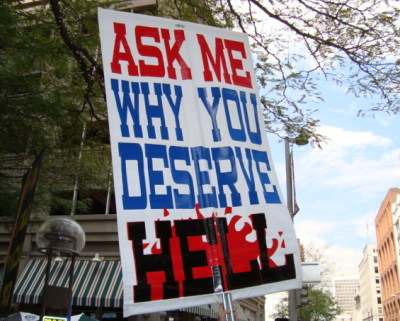Recently, a petition was given to the Bermuda Government in support of same-sex marriage. After this, there was some media coverage, which included an interview with a pastor. In her interview she said that while the advocates were concerned with being “on the right side of history”, she only concerned with being “on the right side of eternity.” She also went on to say that government could not change “divine marriage” and that she has been married for 30 years and gays will “never have that.” I would like to interject here that there are some same-sex couples that have been together longer than her 30 “divine” years. In conversation with a friend, my friend said that this pastor lacks in expressing compassion for the number of couples that have loving, long-standing relationships that, if left up to people like the pastor, will never be recognized and celebrated in the same way this pastor’s relationship is. It doesn’t make hers better – it just highlights how quickly some humans can dismiss the lives and feelings of others. My friend also said that same-sex marriage advocates want equality through marriage enabling all to receive the full rights that everyone claiming to be heterosexual freely enjoys in our society.
So what am I getting at here? My question is, what happened to the concept of a personal relationship with God? Dictionary.com defines personal as “of relating to, or coming as from a particular person; individual; private”, or “intended for use by one person.” So why is it that some religious people say that they have a personal relationship with their God, but constantly try to inject their beliefs into other people’s lives, specifically, using the law? And when I say beliefs, I am not talking about a high level view of a general philosophy; I mean the nitty-gritty, “Thou shalt or thou shalt not” types of beliefs. Some are quick to point out to others that they are sinners, worthy of death and need to repent (they even say this to other Christians). I have even heard someone say how a person who had recently died deserved it because they were not living a “righteous, Christian life.”
We in Bermuda live in a diverse society. There are Christians, Muslims, Buddhists, Hindus, Atheist, and the list goes on. Yes, I will admit that in the 2010 census 70% of respondents stated that they were affiliated with some type of Christian denomination (or non-denomination). However, nine percent responded that their religion was “other” and 19% were not affiliated with religion at all. On top of that, “other” grew by 56% between 2000 and 2010, while “not affiliated” or “nones” grew by 34% during the same time period. The respondents that identified with a Christian denomination decreased by 12% from 2000 to 2010. It is obvious that the religious landscape in Bermuda is changing. With more “others” and “nones”, you would hope that the religious would be more cognizant of this fact, but there continues to be the push to interject beliefs into other person’s lives by some, including through the law of the land.
Do not get me wrong. Everyone is entitled to their beliefs, but this constant barrage of judgments, condemnation and/or evangelism is not fair to those who live their lives another way. Trying to keep certain laws in place because they are seen as “God’s law” is infringing on the rights of people that do not believe the same. For example, do you remember the prohibition of alcohol sales on Sunday? As times have changed, this law became outdated. It was once put in place to enforce some religious belief that not everyone followed or agreed to. Just because some think it is “sinful” to drink on Sunday, doesn’t mean that everyone should adhere to that belief. If you don’t think you should drink on Sunday, well, don’t drink.
In order to live up to the ideals of the cosmopolitan society we are striving to build and maintain here in Bermuda, there has to be a level of understanding and acceptance that everyone is different, and everyone has a different set of beliefs. There also needs to be an understanding that just because we believe our principles are the “right” ones for us, that does not mean that everyone else should follow them. Aristotle said, “It is the mark of an educated mind, to be able to entertain a thought, without accepting it.”
I believe that everyone has the right to pursue a philosophy in life that makes them happy and adds value to their lives, as long as it does not infringe on other people’s lives in a negative way. For some it’s religion, for some it’s education or personal development; there are many ways for people to enrich their experience and live their lives to their fullest potential. If you have a personal relationship with a God and have a set of personal beliefs, why not keep it just that, personal. If there are rules that you have personally agreed with your deity to live by, then you live by them. Do not expect everyone to follow your rules; they are yours and yours alone.





 I like to say that I have always been a skeptic. But, I accept that sometimes our memories can be figments of our imagination. However, I did have questions growing up. I remember hanging out with one of my best friends when we were teenagers and questioning the things we were taught from the Bible. As a gust of wind would go by, we would laugh and say that God was going to kill us because we were asking questions about the secrets of his nature.
I like to say that I have always been a skeptic. But, I accept that sometimes our memories can be figments of our imagination. However, I did have questions growing up. I remember hanging out with one of my best friends when we were teenagers and questioning the things we were taught from the Bible. As a gust of wind would go by, we would laugh and say that God was going to kill us because we were asking questions about the secrets of his nature.